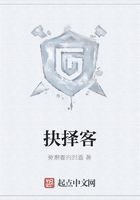The moon was an hour high.Fifty years back from the gate stood the house, under its noble grove.The road ran in front, and then came the grass-grown levee and the insatiate river beyond.Just above the levee top a tiny red light was creeping down and a tiny green one was creeping up.Then the passing steamers saluted, and the hoarse din startled the drowsy silence of the melancholy lowlands.The stillness returned, save for the little voices of the night--the owl's recitative, the capriccio of the crickets, the concerto of the frogs in the grass.The piccaninnies and the dawdlers from the quarters had been dismissed to their confines, and the melee of the day was reduced to an orderly and intelligent silence.The six coloured waiters, in their white jackets, paced, cat-footed, about the table, pretending to arrange where all was beyond betterment.Absalom, in black and shining pumps posed, superior, here and there where the lights set off his grandeur.And Grandemont rested in his chair, waiting for his guests.
He must have drifted into a dream--and an extravagant one--for he was master of Charleroi and Adele was his wife.She was coming out to him now; he could hear her steps; he could feel her hand upon his shoulder--"/Pardon moi, M'shi Grande/"--it was Absalom's hand touching him, it was Absalom's voice, speaking the /patois/ of the blacks--"but it is eight o'clock."
Eight o'clock.Grandemont sprang up.In the moonlight he could see the row of hitching-posts outside the gate.Long ago the horses of the guests should have stood there.They were vacant.
A chanted roar of indignation, a just, waxing bellow of affront and dishonoured genius came from Andre's kitchen, filling the house with rhythmic protest.The beautiful dinner, the pearl of a dinner, the little excellent superb jewel of a dinner! But one moment more of waiting and not even the thousand thunders of black pigs of the quarter would touch it!
"They are a little late," said Grandemont, calmly."They will come soon.Tell Andre to hold back dinner.And ask him if, by some chance, a bull from the pastures has broken, roaring, into the house."
He seated himself again to his cigarettes.Though he had said it, he scarcely believed Charleroi would entertain company that night.For the first time in history the invitation of a Charles had been ignored.So ****** in courtesy and honour was Grandemont, and, perhaps, so serenely confident in the prestige of his name, that the most likely reasons for the vacant board did not occur to him.
Charleroi stood by a road travelled daily by people from those plantations whither his invitations had gone.No doubt even on the day before the sudden reanimation of the old house they had driven past and observed the evidences of long desertion and decay.They had looked at the corpse of Charleroi and then at Grandemont's invitations, and, though the puzzle or tasteless hoax or whatever the thing meant left them perplexed, they would not seek its solution by the folly of a visit to that deserted house.
The moon was now above the grove, and the yard was pied with deep shadows save where they lightened in the tender glow of outpouring candle light.A crisp breeze from the river hinted at the possibility of frost when the night should have become older.The grass at one side of the steps was specked with the white stubs of Grandemont's cigarettes.The cotton-broker's clerk sat in his chair with the smoke spiralling above him.I doubt that he once thought of the little fortune he had so impotently squandered.Perhaps it was compensation enough for him to sit thus at Charleroi for a few retrieved hours.
Idly his mind wandered in and out many fanciful paths of memory.He smiled to himself as a paraphrased line of Scripture strayed into his mind: "A certain /poor/ man made a feast."
He heard the sound of Absalom coughing a note of summons.Grandemont stirred.This time he had not been asleep--only drowsing.
"Nine o'clock, /M'shi Grande/," said Absalom in the uninflected voice of a good servant who states a fact unqualified by personal opinion.
Grandemont rose to his feet.In their time all the Charleses had been proven, and they were gallant losers.
"Serve dinner," he said calmly.And then he checked Absalom's movement to obey, for something clicked the gate latch and was coming down the walk toward the house.Something that shuffled its feet and muttered to itself as it came.It stopped in the current of light at the foot of the steps and spake, in the universal whine of the gadding mendicant.
"Kind sir, could you spare a poor, hungry man, out of luck, a little to eat? And to sleep in the corner of a shed? For"--the thing concluded, irrelevantly--"I can sleep now.There are no mountains to dance reels in the night; and the copper kettles are all scoured bright.The iron band is still round my ankle, and a link, if it is your desire I should be chained."
It set a foot upon the step and drew up the rags that hung upon the limb.Above the distorted shoe, caked with the dust of a hundred leagues, they saw the link and the iron band.The clothes of the tramp were wreaked to piebald tatters by sun and rain and wear.A mat of brown, tangled hair and beard covered his head and face, out of which his eyes stared distractedly.Grandemont noticed that he carried in one hand a white, square card.
"What is that?" he asked.
"I picked it up, sir, at the side of the road." The vagabond handed the card to Grandemont."Just a little to eat, sir.A little parched corn, a /tortilla/, or a handful of beans.Goat's meat I cannot eat.
When I cut their throats they cry like children."
Grandemont held up the card.It was one of his own invitations to dinner.No doubt some one had cast it away from a passing carriage after comparing it with the tenantless house of Charleroi.
"From the hedges and highways bid them come," he said to himself, softly smiling.And then to Absalom: "Send Louis to me."
Louis, once his own body-servant, came promptly, in his white jacket.















